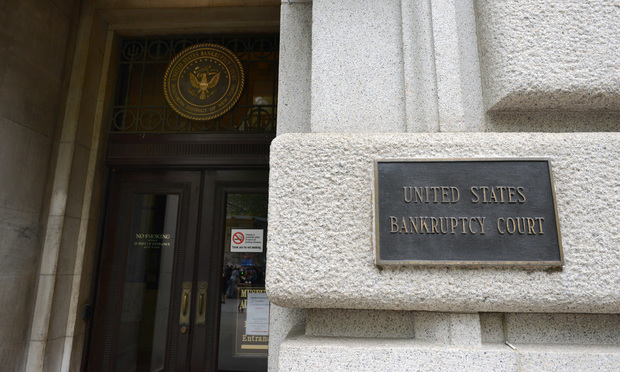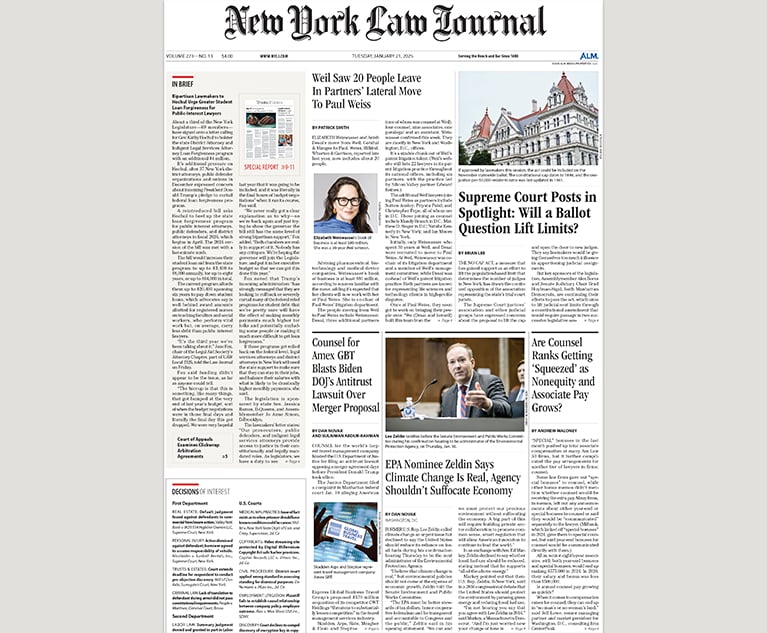Bankrupt Lawyer Beats Law Firm Lender Over Interest in Co-Op Proceeds
While Jeffrey Liddle prevailed this month in a dispute with a law firm lender, several other disputes remain in his bankruptcy case. His law firm continues to function, generating about $2 million in revenue last year.
September 12, 2019 at 02:57 PM
4 minute read
 U.S. Bankruptcy Court for the Southern District of New York
U.S. Bankruptcy Court for the Southern District of New York
Jeffrey Liddle, a New York employment lawyer who filed for bankruptcy this year, prevailed in a dispute with law firm lender Counsel Financial over the security interest it claimed to have in the sale proceeds of Liddle's co-op.
But several other disputes remain in Liddle's Chapter 11 case, filed in March when he reported that creditors were pursuing him for more than $10 million. In July, his own firm, Liddle & Robinson, filed for Chapter 11 bankruptcy protection.
Liddle is the only partner remaining at Liddle & Robinson, known for representing white-collar professionals in suits against their employers. The firm continues to function. Liddle has said it has about 35 cases in its portfolio. In 2018, according to its bankruptcy papers, its revenues were about $2 million. That's down from about $5 million the year before.
In a decision posted Friday, U.S. Bankruptcy Judge Sean Lane of the Southern District of New Yotk rejected law firm lender Counsel Financial's claim to have a perfected security interest in Liddle's $1.1 million share of the sale proceeds of a co-op apartment he and his wife owned.
The decision does not appear to have a practical effect, as Liddle was given permission in April to use the funds to operate his law firm business and make personal outlays according to an approved budget. Counsel Financial still has other avenues to try to recover what remains outstanding of the $7 million it says it has loaned Liddle's firm.
 Jeffrey Liddle. Courtesy photo
Jeffrey Liddle. Courtesy photoAn affiliate called Counsel Financial II, which sued Liddle in Erie County Supreme Court before he filed for bankruptcy, argued that its loan was secured because it had "possession" of the sale proceeds under Section 9-133 of the New York Uniform Commercial Code. It said that Liddle's lawyer Diane Nardone, who was holding the money in escrow under the terms of an agreed-upon order in Erie County, did so for CFII's benefit.
But Lane said that wasn't the case.
"CFII contends that by appointing Nardone to act as escrow agent, the stipulated order essentially made Nardone CFII's agent and perfected CFII's security interest in the cash proceeds once Nardone took possession of the funds," the judge wrote. "But Nardone was holding the sale proceeds as an agent of the debtor, not for CFII. That is, in fact, exactly what the stipulated order says."
Liddle had argued that the security interest hadn't been perfected because an attachment order entered by the Erie County court hadn't been filed with a sheriff. Counsel Financial ultimately didn't argue that the attachment order was the basis for its perfected security interest, however.
While Liddle won out in Friday's decision, many issues remain to be hashed out in his Chapter 11 case and that of Liddle & Robinson.
In addition to going after Liddle's share of the coop sale proceeds, Counsel Financial has gone after the 50% of the proceeds received by his wife, who has filed an adversary proceeding against the lender.
Meanwhile, Liddle's firm has sought to query former partner Blaine Bortnick, who is now at the firm Rasco Klock, a firm with offices in Miami and New York that lists 16 lawyers on its website, about any communications or deals he might have struck with Counsel Financial. Liddle has said in court papers Bortnick purportedly settled with the lender, but no details have been provided. Bortnick didn't respond to comment requests.
David Wander, a lawyer at Davidoff Hutcher & Citron who represents Counsel Financial, said "as a practical matter, [the decision] doesn't really change things," saying his client had assented to Liddle's use of the collateral pursuant to court-approved budgets.
"The big issue is the law firm bankruptcy," he said. "That's where the main collateral and the main asset [is]." Wander asserted that his client has a lien on the firm's cases and the cash collateral.
Alison Bauer, a lawyer for Liddle at Foley Hoag, didn't respond to a comment request and Liddle declined to comment.
Counsel Financial didn't immediately respond to a comment request.
This content has been archived. It is available through our partners, LexisNexis® and Bloomberg Law.
To view this content, please continue to their sites.
Not a Lexis Subscriber?
Subscribe Now
Not a Bloomberg Law Subscriber?
Subscribe Now
NOT FOR REPRINT
© 2025 ALM Global, LLC, All Rights Reserved. Request academic re-use from www.copyright.com. All other uses, submit a request to [email protected]. For more information visit Asset & Logo Licensing.
You Might Like
View All
Neighboring States Have Either Passed or Proposed Climate Superfund Laws—Is Pennsylvania Next?
7 minute read
Trending Stories
- 15th Circuit Considers Challenge to Louisiana's Ten Commandments Law
- 2Crocs Accused of Padding Revenue With Channel-Stuffing HEYDUDE Shoes
- 3E-discovery Practitioners Are Racing to Adapt to Social Media’s Evolving Landscape
- 4The Law Firm Disrupted: For Office Policies, Big Law Has Its Ear to the Market, Not to Trump
- 5FTC Finalizes Child Online Privacy Rule Updates, But Ferguson Eyes Further Changes
Who Got The Work
J. Brugh Lower of Gibbons has entered an appearance for industrial equipment supplier Devco Corporation in a pending trademark infringement lawsuit. The suit, accusing the defendant of selling knock-off Graco products, was filed Dec. 18 in New Jersey District Court by Rivkin Radler on behalf of Graco Inc. and Graco Minnesota. The case, assigned to U.S. District Judge Zahid N. Quraishi, is 3:24-cv-11294, Graco Inc. et al v. Devco Corporation.
Who Got The Work
Rebecca Maller-Stein and Kent A. Yalowitz of Arnold & Porter Kaye Scholer have entered their appearances for Hanaco Venture Capital and its executives, Lior Prosor and David Frankel, in a pending securities lawsuit. The action, filed on Dec. 24 in New York Southern District Court by Zell, Aron & Co. on behalf of Goldeneye Advisors, accuses the defendants of negligently and fraudulently managing the plaintiff's $1 million investment. The case, assigned to U.S. District Judge Vernon S. Broderick, is 1:24-cv-09918, Goldeneye Advisors, LLC v. Hanaco Venture Capital, Ltd. et al.
Who Got The Work
Attorneys from A&O Shearman has stepped in as defense counsel for Toronto-Dominion Bank and other defendants in a pending securities class action. The suit, filed Dec. 11 in New York Southern District Court by Bleichmar Fonti & Auld, accuses the defendants of concealing the bank's 'pervasive' deficiencies in regards to its compliance with the Bank Secrecy Act and the quality of its anti-money laundering controls. The case, assigned to U.S. District Judge Arun Subramanian, is 1:24-cv-09445, Gonzalez v. The Toronto-Dominion Bank et al.
Who Got The Work
Crown Castle International, a Pennsylvania company providing shared communications infrastructure, has turned to Luke D. Wolf of Gordon Rees Scully Mansukhani to fend off a pending breach-of-contract lawsuit. The court action, filed Nov. 25 in Michigan Eastern District Court by Hooper Hathaway PC on behalf of The Town Residences LLC, accuses Crown Castle of failing to transfer approximately $30,000 in utility payments from T-Mobile in breach of a roof-top lease and assignment agreement. The case, assigned to U.S. District Judge Susan K. Declercq, is 2:24-cv-13131, The Town Residences LLC v. T-Mobile US, Inc. et al.
Who Got The Work
Wilfred P. Coronato and Daniel M. Schwartz of McCarter & English have stepped in as defense counsel to Electrolux Home Products Inc. in a pending product liability lawsuit. The court action, filed Nov. 26 in New York Eastern District Court by Poulos Lopiccolo PC and Nagel Rice LLP on behalf of David Stern, alleges that the defendant's refrigerators’ drawers and shelving repeatedly break and fall apart within months after purchase. The case, assigned to U.S. District Judge Joan M. Azrack, is 2:24-cv-08204, Stern v. Electrolux Home Products, Inc.
Featured Firms
Law Offices of Gary Martin Hays & Associates, P.C.
(470) 294-1674
Law Offices of Mark E. Salomone
(857) 444-6468
Smith & Hassler
(713) 739-1250








